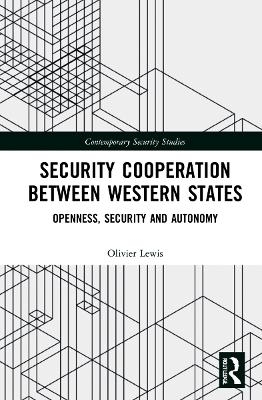
Security Cooperation between Western States
Openness, Security and Autonomy
Seiten
2022
Routledge (Verlag)
978-0-367-02815-2 (ISBN)
Routledge (Verlag)
978-0-367-02815-2 (ISBN)
This book examines security cooperation between Western states.
Security cooperation occurs between Western (i.e. European and North American) states as a coping mechanism, as an imperfect substitute for integration. The book investigates the reasons for cooperation, what Aristotle called the ‘final cause’, as well as the material, formal, and efficient causes of cooperation. Such a causal explanation is based on a Critical Realist philosophy of social science. The book is also based on an embedded multiple-case study; the states studied are the United States, France, and Luxembourg. Within each state, the embedded subcases are three types of state security organizations: the armed forces, law enforcement, and intelligence agencies, which have rarely been compared in this way. Comparing different types of states and different types of state security organizations has allowed temporal, spatial, national, and functional variation in cooperation to be identified and theorized. The empirical evidence studied includes participant observations at the North Atlantic Treaty Organization and documents such as state policy documents, annual reports by organizations, reports by parliaments and non-governmental organizations, autobiographies, books by investigative journalists, and articles by newspapers and magazines. The book is also based on a score of elite interviews with ambassadors, diplomatic liaisons, ministerial advisors, foreign ministry officials, and military commanders.
This book will be of much interest to students of security studies, intelligence studies, military studies and International Relations in general.
Security cooperation occurs between Western (i.e. European and North American) states as a coping mechanism, as an imperfect substitute for integration. The book investigates the reasons for cooperation, what Aristotle called the ‘final cause’, as well as the material, formal, and efficient causes of cooperation. Such a causal explanation is based on a Critical Realist philosophy of social science. The book is also based on an embedded multiple-case study; the states studied are the United States, France, and Luxembourg. Within each state, the embedded subcases are three types of state security organizations: the armed forces, law enforcement, and intelligence agencies, which have rarely been compared in this way. Comparing different types of states and different types of state security organizations has allowed temporal, spatial, national, and functional variation in cooperation to be identified and theorized. The empirical evidence studied includes participant observations at the North Atlantic Treaty Organization and documents such as state policy documents, annual reports by organizations, reports by parliaments and non-governmental organizations, autobiographies, books by investigative journalists, and articles by newspapers and magazines. The book is also based on a score of elite interviews with ambassadors, diplomatic liaisons, ministerial advisors, foreign ministry officials, and military commanders.
This book will be of much interest to students of security studies, intelligence studies, military studies and International Relations in general.
Olivier Lewis has a PhD in International Relations from the University of St Andrews, Scotland. He is a Lecturer in Defence Studies Education in the Defence Studies Department at King's College London.
1. Introduction, 2. What Makes Security Cooperation Possible, 3. Military Cooperation and the Search for Flexible Security, 4. Law Enforcement Cooperation and the Forces of Social Order, 5. Intelligence Cooperation and the Benefits of Differentiation, 6. Conclusions: Change within Limits
| Erscheinungsdatum | 16.12.2020 |
|---|---|
| Reihe/Serie | Contemporary Security Studies |
| Verlagsort | London |
| Sprache | englisch |
| Maße | 156 x 234 mm |
| Gewicht | 453 g |
| Themenwelt | Sozialwissenschaften ► Politik / Verwaltung ► Europäische / Internationale Politik |
| ISBN-10 | 0-367-02815-8 / 0367028158 |
| ISBN-13 | 978-0-367-02815-2 / 9780367028152 |
| Zustand | Neuware |
| Informationen gemäß Produktsicherheitsverordnung (GPSR) | |
| Haben Sie eine Frage zum Produkt? |
Mehr entdecken
aus dem Bereich
aus dem Bereich
Studienbuch
Buch | Hardcover (2023)
De Gruyter Oldenbourg (Verlag)
44,95 €
Amerikas Strategie der Vorherrschaft und der Kampf um Eurasien
Buch | Softcover (2024)
NOMEN Verlag
20,00 €


